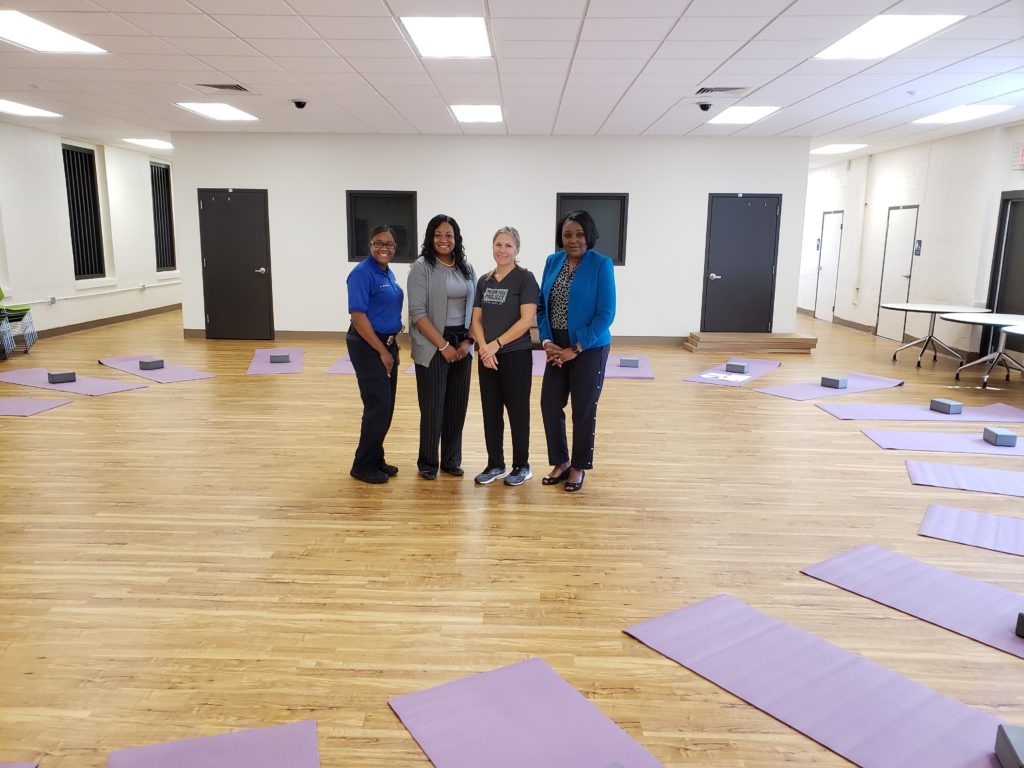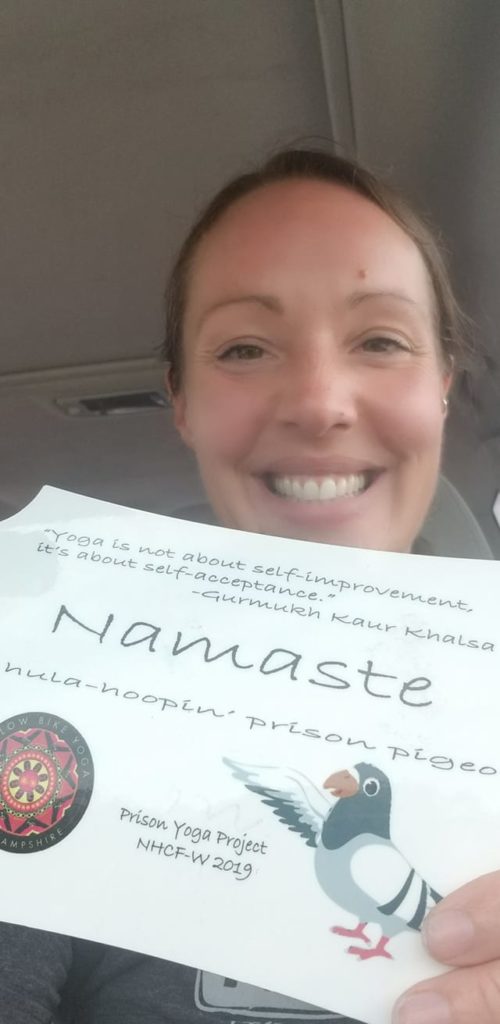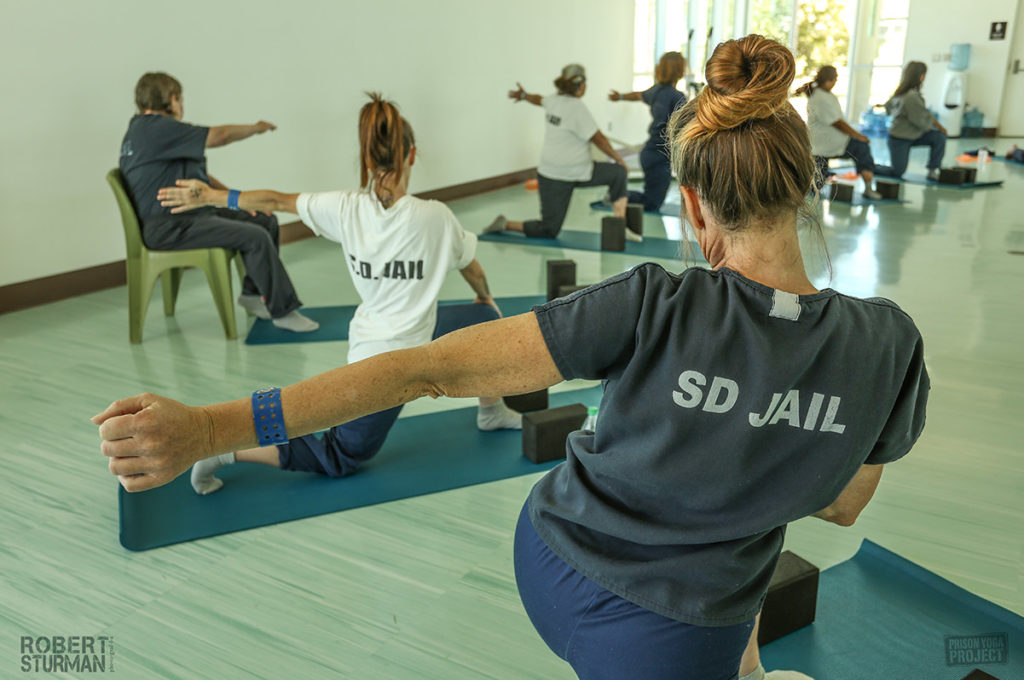Women and girls make up about 10% of the total number of people incarcerated in the United States. Yet, they represent the fastest-growing segment of incarcerated people, growing twice as fast as incarcerated men.
Their incarceration often has a disproportionate impact on their communities. A majority of these women are mothers and primary caretakers for their children. About 5% of women in jail and about 4% in prison are pregnant at the time of their incarceration. Most are incarcerated for non-violent offenses, are often victims of domestic abuse, suffer higher rates of mental health issues than incarcerated men, and have higher rates of trauma as well.
For too long, there has been insufficient access to gender-responsive, rehabilitative programs to help these women and girls recover from the circumstances that led to their incarceration and successfully reintegrate into their communities.
Prison Yoga Project is working to change that. The women we serve need to know that they are not invisible; that there are people on the outside who support them and believe in their strength to heal.
I want to introduce you to three programs we offer for women from one end of the country to the other, with the sincere hope that our community can continue to grow yoga programming for this often neglected, yet remarkable, population. You can show your support for these women – and all our participants – by making a contribution to our end-of-year fundraising campaign today.
Julia Tutwiler Prison for Women, Wetumpka, Alabama
If you’ve heard of the Julia Tutwiler Prison for Women, it’s probably not for a good reason. The facility gained notoriety in an infamous 2014 Department of Justice Report, which documented persistent sexual and emotional abuse of the women incarcerated there, including several pregnancies resulting from sexual assaults by officers at the facility.
That report was a wake-up call. Since that time, the Alabama Department of Corrections (ADOC) and the staff of Tutwiler has worked to change the abusive atmosphere to one of rehabilitation. Recognizing the need to repair the trauma incarcerated women carried when entering the facility and trauma they face while incarcerated, the staff has intentionally sought trauma-informed, gender-responsive programs to help provide tools to help women heal. Alabama Department of Corrections’ Chief Psychiatrist, Dr. Edward Kern, recommended Prison Yoga Project.
In my first visit to Tutwiler to discuss conducting a pilot program there, the feeling that I was a part of a larger team that genuinely cared for the women at Tutwiler overcame me. The welcome we received from Tutwiler’s Warden, Deidra Wright, was so gracious.
We began our 12-week evaluated pilot program there in October of this year. Our twenty-five participants practice yoga in a beautiful recreation room, newly built to create space for more programming at the prison. On the first day of classes, PYP Facilitator, Susie Weigel, arrived to find staff, including Warden Wright, already at work arranging the mats and blocks for practice. Since the program began, participants have expressed gratitude for the program. We’re looking forward to sharing the outcomes of the pilot program with you early next year.

We will also be starting a pilot program for the correctional officers and other staff at Tutwiler in 2020. When Warden Wright and her team expressed an interest, we were pleased to answer the call. The ADOC hopes to attract and retain quality staff as well as encourage more women to work at the facility. Having more women working at the facility is a goal intended to help the women incarcerated there to feel a greater sense of safety. And, as we know, officers and other staff in prisons and jails pay a tremendous price for working under stressful conditions. So we hope this program will prove an effective way for them to manage their stress and will also help to create a culture of empathy and compassion within the facility. We expect the trend of offering yoga for corrections staff and officers will continue and grow.
New Hampshire State Correctional Facility for Women, Concord, New Hampshire
As many of you know, after you’ve been practicing for a while, a desire to share the practice with others arises. So, I want to share with you the work of Prison Yoga Project’s New Hampshire Chapter, led by Chapter Director, Jen Lindgren.

Jen used to facilitate programs on Mondays, Wednesdays, and Fridays at the New Hampshire State Correctional Facility for Women. Lately, she has shifted to supervising on Fridays because the women incarcerated at the facility now lead the Friday classes. My stomach flutters with excitement as I get to write that sentence.
In the Spring and Summer of 2019, Jen facilitated a 200-hour yoga teacher training for ten women. These women participated in weekly yoga classes, as well as full-day workshops on Sundays, two hours of journaling and self-study per week, and observations of their teaching. The cohort graduated in July 2019, and have now taken on the Friday classes at the facility.
Out of all of the positive feedback the women shared, this quote stood out to me as particularly compelling:
“Well, I got to have growth not only within myself but with a group of women. All of us got a little bit stronger through this journey finding out who we are, some of us letting go of the messes we made for ourselves, some of us letting go of the messes others made for us, surrendering ourselves to what life is supposed to give us instead of what everyone else says we should have, understanding the secret of life starts within ourselves. Thanks to you and this yoga training I’ve learned I am not my circumstances. I can bounce back. It will be okay.”
Again, “I am not my circumstances.” Cue overwhelming feeling of inspiration.
This program has lasting effects. Two of the women who completed this training have recently transitioned to a re-entry home, where they were permitted by the New Hampshire Department of Corrections to continue to facilitate yoga classes for other residents. The department is also working to grant reduced sentencing credits to women who have completed yoga teacher training.
In January 2020, Jen will begin working with a new round of women, and we are all looking forward to its start. Prison Yoga Project New Hampshire is one of our most recently established Chapters, and they are off to a great start!
Las Colinas Detention and Reentry Facility, San Diego County, California
The year 2014 was a landmark year at Las Colinas Detention and Reentry Facility (LCDRF) in Santee, California, when a newly rebuilt facility opened its doors. The San Diego County Sheriff’s Department designed and built the new facility around philosophy oriented toward trauma-informed, gender-responsive programming and education.
I was lucky enough to see LCDRF up close in 2017 when I visited the team in San Diego and attended our program there. The facility is reminiscent of a college campus with wide-open spaces covered with grass and paths that meander from the dorms to the classrooms and dining hall. It’s entirely unlike the traditional detention center. It is masterfully designed, with the intention of conveying an atmosphere of hope.

Under the leadership of Kate Beckel, Chapter Director and Senior Trainer, Prison Yoga Project’s San Diego Chapter provides two programs a week at LCDRF for approximately 30 participants. It’s heartwarming to receive feedback like the following from women in our program at LCDRF:
“Since taking this class, I have felt less stressed. It has opened up the door to meditation and yoga. Whenever I have long days and feel like I can’t make it through, I stop, breathe, and do a couple of poses to calm down. Yoga is definitely helpful because we can’t run or do hardcore workouts so yoga is definitely an awesome option.”
“Yoga allows me to take a breath and think before I respond to others. Yoga is great for stress, tension, mind, body, and soul.”
“I share the progress of yoga with my husband. After each class, I feel better than before class. Before each class, I might feel lazy because it’s cold and I already had a long day with other classes. I push myself to come, and I don’t regret it at all. I’m glad I did it. I’m learning more how to deal with emotions. It would benefit me for sure upon my release.“
LCDRF is a model for other correctional facilities that want to change the way our nation treats incarcerated women, and Prison Yoga Project is honored to provide programs that support this reform.
Changing the narrative for women
As a 27-year-old woman, I often feel that there are overwhelming obstacles to overcome to assure that all women are supported to become the best versions of themselves. I have come to understand how physical, sexual, and emotional abuse, racism, domestic violence, over-sexualization, unequal pay, and society’s unrealistic expectations often culminate in women’s choices that lead to negative consequences and incarceration.
I am tired of this narrative. Women are tired of being less than.
I am encouraged by this work and inspired by brave women who show up to change the story written for them by society. The incarcerated women we serve, our Facilitators, our women leaders in correctional facilities are changing and taking charge of their own stories. Yoga is one of the tools in which they foster this change.
It is with gratitude that I show up for them, and get to share a piece of their work and hearts with you.
With peace,

Nicole Hellthaler
National Program Manager
Prison Yoga Project
“The women we serve need to know that they are not invisible; that there are people on the outside who support them and believe in their strength to heal.“
Your contribution today sends a message that these women are seen and that you believe in their strength to heal. Thank you!